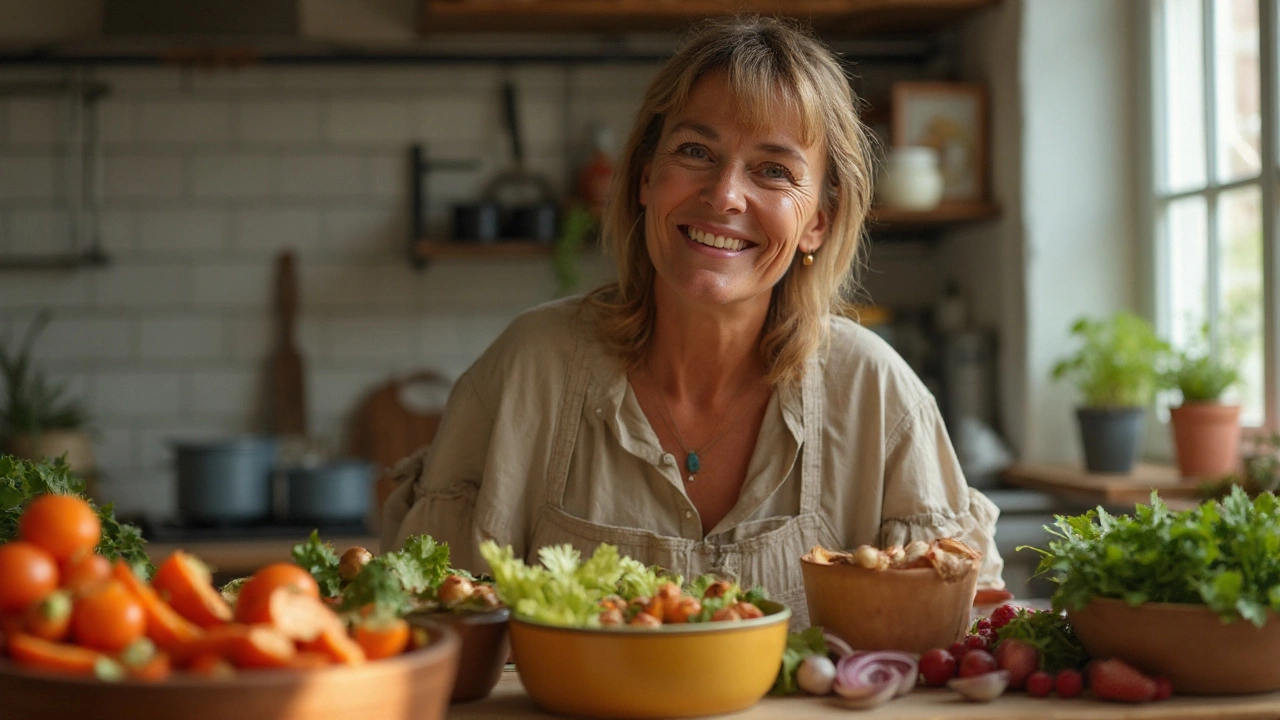Most people don’t expect anti-aging advice to sound this simple, but ask around, and you’ll notice something curious: a surprising chunk of folks fueling up on plants somehow keep their skin plumper, their eyes clearer, and that energy spark flickering longer than others their age. It’s not just some lucky gene pool. More and more, it’s showing up in studies—and honestly, if you stand in a crowd and play “guess who’s a vegetarian,” you’ll usually spot it by who has that smooth, peachy skin and bright expression. So, what’s really going on? Do avocados and beans actually turn back the clock?
What Happens to Your Body on a Vegetarian Diet?
If you’ve ever watched a friend swap burgers for quinoa, you probably noticed changes that go well beyond weight. Skin starts to glow differently, dark circles fade, fine lines stay hiding a bit longer. The secret? Plant-heavy diets often give your cells a far better life than they get with tons of animal products. First, there’s the antioxidant highway. Fruits, veggies, nuts, and seeds are brimming with vitamin C, vitamin E, beta-carotene, polyphenols, and flavonoids—compounds that eat up the free radicals your body churns out from stress, sun, and city life. Fewer free radicals means less cellular damage, which translates to skin staying firmer and organs aging slower.
Let’s talk about sugar. Diets high in refined sugar—think soda, pastries, and white bread—can spark a process called glycation, which messes with collagen and elastin in your skin. These two are basically the ropes that tie your face together. Plants naturally pack in fiber and slow the release of sugar into your blood, helping your skin dodge those sugar wrinkles. A 2023 review published in the journal Nutrients nailed this point: people eating mostly plants had fewer visible wrinkles than those with lots of processed carbs and saturated fats clogging up their plates.
Then there’s inflammation, the silent troublemaker behind everything from acne to early wrinkles to heart disease. Most Western diets stoke inflammation (blame all the red meat and fried foods), but a British diet survey in 2022 found vegetarians had up to 35% lower inflammation markers compared to omnivores. That makes sense when you realize foods like berries, dark leafy greens, and turmeric put the brakes on the body’s inflammatory response, cooling things down from the inside.
Hydration plays a sneaky role too. Plant foods like cucumbers, tomatoes, lettuce, and oranges are loaded with water. Unlike a greasy burger that weighs you down, a salad or a bean stew plumps up your skin’s cells from the inside—think of it like an internal face mist. My own wife, Elara, started eating more fruits and leafy greens last year, and honestly, it was like she upgraded to a better moisturizer without touching a bottle.
What about protein? That question always comes up. The truth is, you can absolutely get enough protein from plant sources—beans, lentils, chickpeas, tofu all pack in the muscle-makers, but without the same load of saturated fats that tend to irritate the skin. When you add in whole grains and seeds, your body gets all those essential amino acids (the stuff collagen is made of) and uses them to keep skin from sagging as you age.
| Key Nutrient | Main Plant Sources | Anti-Aging Benefit |
|---|---|---|
| Vitamin C | Bell peppers, kiwi, citrus, broccoli | Boosts collagen, helps heal skin |
| Vitamin E | Almonds, sunflower seeds, spinach | Protects from sun damage |
| Polyphenols | Berries, tea, dark chocolate | Fights free radical damage |
| Beta-carotene | Carrots, sweet potatoes, pumpkin | Supports new skin growth |
So, what happens to your body on a vegetarian diet? Cells get better protection, your gut flora thrives (more on that later), and the “oil change” your skin gets from all those good fats and antioxidants shows up in the mirror before long. Pretty hard to argue with that kind of insurance.

The Science Linking Vegetarian Diets to Youthful Looks
Alright, so it’s not just Instagram glow filters. There’s cold hard science showing vegetarians are winning the youth game by a solid margin. Researchers at the University of Oslo followed 1,200 adults over 8 years, tracking their eating habits, bloodwork, and even standardized facial aging scores. Turns out, the vegetarians looked an average of 3.6 years younger than meat-eaters by the end of the study, after controlling for smoking, exercise, and sun exposure.
One big reason is plant-based diets reduce a process called oxidative stress. Imagine your cells getting tiny sparks of rust every day from pollution, fast food, stress—those sparks break down proteins, fats, and DNA. Plants offer a squad of antioxidants that soak up those sparks, letting everything from your skin to your eyes work like they did when you were younger. That’s not poetic fluff; a 2024 paper in The Journal of Clinical Nutrition found plant-based eaters had 25% less oxidative DNA damage than those who loaded up on animal products.
Another area where plant-eaters win is in the balance of omega fats. Fat gets a bad reputation, but the type matters. Plant-heavy diets deliver more omega-3s and less omega-6s, keeping cell membranes flexible and skin elastic. Chia, flaxseed, walnuts—these aren’t just for granola crowd; they’re cranking out the kind of fats your body needs to stay bouncy. Good fats also help you absorb fat-soluble skin vitamins like A, D, E, and K, meaning even more stockpiling of the building blocks for great skin.
Studies out of Taiwan in 2022 measured the telomere length (think of it as the fuse on your DNA) in vegetarians versus omnivores. Longer telomeres are known to be linked with slower cellular aging. The vegetarians had consistently longer telomeres, even when BMI, age, and activity were accounted for. That’s not magic, it’s cellular maintenance at a molecular level—built by what you eat every day.
Don’t overlook gut health, either. Your gut is basically your body’s operating system, running the show for everything from immunity to skin health. Plants fuel the right kind of gut bacteria—the “good guys”—that lower inflammation, keep hormones balanced, and even boost vitamin absorption. A 2022 German trial looked at identical twins (one vegetarian, one not) and the difference in their skin and hair after 18 months. The vegetarian twins ended up with noticeably fuller hair, clearer skin, and fewer inflammatory markers as tracked in stool samples. Seriously, twins! Can’t get a more convincing test than that.
Hormones play their part too. People eating more plants usually keep their insulin and cortisol levels steadier. Elevated cortisol from chronic stress rapidly thins the skin and packs on belly fat. Foods like dark chocolate, avocados, and green leafy vegetables naturally tamp down stress hormones, working as edible “chill pills.” Swapping steak for a hearty lentil curry could do more than you think for those worry lines.
And yes, sleep counts. Getting all the B vitamins, magnesium, and a lower load of saturated fats helps a ton with deeper, more restorative sleep cycles. That means less tossing and turning, better overnight repair, and a fresher face in the morning. If you’ve ever tracked your sleep on a wearable, you’ll probably spot the bump in REM cycles when your diet swings plant-forward for even just a few weeks.
| Research Study | Main Finding | Vegetarian Group Compared To |
|---|---|---|
| University of Oslo, 2019-2027 | Looked 3.6 years younger on average | Meat-eaters (matched for age and lifestyle) |
| Journal of Clinical Nutrition, 2024 | 25% less oxidative DNA damage | Animal-product heavy diets |
| Taiwanese Telomere Study, 2022 | Longer cell telomeres, slower aging | Omnivores, same BMI/age/activity |
| German Twin Trial, 2022 | Fuller hair, clearer skin, less gut inflammation | Identical twin meat-eaters |
Science is catching up to what people have been guessing for a while: if you load your plate with the right plants, you’re basically dialing up your own body’s ability to slow down visible and invisible aging. And you don’t need a degree to start—you just need a grocery list.

Smart Tips for Looking Younger—The Vegetarian Way
Alright, so if the science is this solid, how do you make it work for your everyday life? Truth is, skipping meat is just the start. It’s about picking the right plants and stacking your meals with the sort of nutrients that crank up your glow. Don’t think it’s a Ramen-and-peanut-butter-sandwich situation—trust me, you don’t get the perks just by cutting steak and living on kettle chips or plain pasta. Here’s how you can squeeze the best out of this way of eating:
- Color is your clock-stopper. Try to get at least five different colors on your plate every day. The pigments in deep red tomatoes, purple eggplants, green peppers, orange carrots, and blue berries all work slightly differently to block free radicals and help your skin rebuild better. Think of it as insurance for your dermis.
- Make friends with legumes. Chickpeas, lentils, black beans, and peas aren’t just protein—they’re also full of zinc, iron, and fiber, which matter just as much for keeping skin firm and reducing dullness.
- Seeds and nuts aren’t snack food—they’re skin support. Walnuts, chia, flax, and sunflower seeds get plenty of love in smoothies and salads at my place. Yes, you’ll feel the difference if you aim for a handful each day.
- Leafy greens are underrated. Swiss chard, spinach, kale, arugula, amaranth—whichever you have locally. Steam them, saute, throw in a soup, or blend for breakfast. The folate and vitamin K add up over the year to a real anti-aging punch.
- Don’t ignore whole grains. Quinoa isn’t just hype—it’s loaded with protein and B vitamins. Same goes for farro, oats, millet, and wild rice. Shifting half your grains to be whole will show up in your hair and nails quickly.
- Hydrate the easy way—with food. A typical 2-cup salad bowl can deliver up to 200ml of water, and add fiber at the same time. Pair it with juicy citrus fruit or a watermelon wedge and you boost hydration without chugging liters.
- Find a tea you love. Green tea has catechins, which are skin superheroes. Black teas and even hibiscus can lower blood pressure and boost skin’s circulation—all helpful for that springy, youthful look.
- Go light on ultra-processed foods. Even on a vegetarian plan, chips, cookies, and some meat substitutes sneak in. Stick mostly to foods you recognize straight out of the ground or package.
- Mix in fermented foods. Sauerkraut, fermented kimchi, plain yogurt (if you’re not vegan) or miso soup keep gut bacteria thriving, which shows on your face before you know it.
- Supplement if you must, but keep it simple. B12 and vitamin D can be tricky to get if you’re plant-only, so consider a supplement like most long-term vegetarians do. This tiny insurance can pay off in keeping your energy and skin balanced.
If you’re aiming for that “you don’t look your age” moment, timing matters too. Consistency wins the race—one plant-forward meal here and there won’t change much long-term, but swinging most meals to the rainbow side definitely can. From my own experience (and taste-buds), mixing up new veggie curries, seasonal salads, or those Japanese rice bowls Elara loves, keeps things both interesting and youth-friendly.
One myth that needs busting: you don’t need to go 100% vegan overnight. Even doing Meatless Mondays or following the “80/20” plan (80% plants, 20% flexibility) racks up anti-aging points. Several dermatologists now recommend plant-centered diets for skin disorders, and they tend to notice their patients look more rested, less patchy, and just…well, fresher.
If you need extra inspiration, look at the health data. Countries with the most plant-based traditional diets—think Mediterranean staples like Crete or Okinawan food from Japan—also have the longest-living, best-aging populations. These spots eat veggies, beans, nuts, olive oil, and only the occasional small bit of fish, but the concept is the same. People there are walking, talking examples that you can eat lots, stay full, and keep that “age-defying” edge just by loading up on the right green stuff.
Last thing: don’t feel pressured to go this road alone. If you share a kitchen with others, make it an adventure. Elara and I set aside Sundays for experimental cooking (yes, sometimes the beet burgers flopped), but it keeps things from turning stale or boring, which means you actually stick with the plan. And that, as all the research shows, is key to keeping your mirror and your body guessing for the better.

